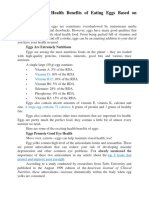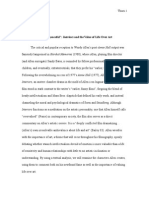0 ratings0% found this document useful (0 votes)
3 viewsAll About Eggs
All About Eggs
Uploaded by
Jas AtondoThe document discusses the nutritional content and health aspects of eggs. It states that eggs contain vitamins, minerals, and protein that are part of a healthy diet. While eggs were once thought to be unhealthy due to their cholesterol content, research now shows that moderate egg consumption of up to one egg per day does not increase heart disease risk for healthy individuals. The document provides tips on storing, preparing, and cooking eggs safely.
Copyright:
© All Rights Reserved
Available Formats
Download as DOCX, PDF, TXT or read online from Scribd
All About Eggs
All About Eggs
Uploaded by
Jas Atondo0 ratings0% found this document useful (0 votes)
3 views6 pagesThe document discusses the nutritional content and health aspects of eggs. It states that eggs contain vitamins, minerals, and protein that are part of a healthy diet. While eggs were once thought to be unhealthy due to their cholesterol content, research now shows that moderate egg consumption of up to one egg per day does not increase heart disease risk for healthy individuals. The document provides tips on storing, preparing, and cooking eggs safely.
Original Title
Doc5
Copyright
© © All Rights Reserved
Available Formats
DOCX, PDF, TXT or read online from Scribd
Share this document
Did you find this document useful?
Is this content inappropriate?
The document discusses the nutritional content and health aspects of eggs. It states that eggs contain vitamins, minerals, and protein that are part of a healthy diet. While eggs were once thought to be unhealthy due to their cholesterol content, research now shows that moderate egg consumption of up to one egg per day does not increase heart disease risk for healthy individuals. The document provides tips on storing, preparing, and cooking eggs safely.
Copyright:
© All Rights Reserved
Available Formats
Download as DOCX, PDF, TXT or read online from Scribd
Download as docx, pdf, or txt
0 ratings0% found this document useful (0 votes)
3 views6 pagesAll About Eggs
All About Eggs
Uploaded by
Jas AtondoThe document discusses the nutritional content and health aspects of eggs. It states that eggs contain vitamins, minerals, and protein that are part of a healthy diet. While eggs were once thought to be unhealthy due to their cholesterol content, research now shows that moderate egg consumption of up to one egg per day does not increase heart disease risk for healthy individuals. The document provides tips on storing, preparing, and cooking eggs safely.
Copyright:
© All Rights Reserved
Available Formats
Download as DOCX, PDF, TXT or read online from Scribd
Download as docx, pdf, or txt
You are on page 1of 6
All About Eggs
Eggs and Health
Eggs contain several vitamins and minerals
that are essential parts of a healthful
diet. In many parts of the world, eggs are
a readily available, inexpensive food.
In the past, there was some controversy
about whether eggs are healthful or not,
especially concerning cholesterol. The
current thinking, however, is that, in
moderation, eggs are healthful, as they can
be a good source of protein and other
essential nutrients.
This article describes the nutritional
contents of eggs and possible health
benefits and risks. It also gives tips on
incorporating more eggs into the diet and
looks at egg alternatives.
All About Eggs
Eggs and Health
Research on moderate egg consumption in two
large prospective cohort studies (nearly
40,000 men and over 80,000 women) found
that up to one egg per day is not
associated with increased heart disease
risk in healthy individuals.
Eggs were previously associated with heart
disease risk as a result of their high
cholesterol content. However, a solid body
of research shows that for most people,
cholesterol in food has a smaller effect on
blood levels of total cholesterol and
harmful LDL cholesterol than does the mix
of fats in the diet.
Of course, this research doesn’t give a
green light to daily three-egg omelets.
While a 2008 report from the Physicians’
Health Study supports the idea that eating
an egg a day is generally safe for the
heart, it also suggests that going much
beyond that could increase the risk for
heart failure later in life. You also need
to pay attention to the “trimmings” that
come with your eggs. To your cardiovascular
system, scrambled eggs, salsa, and a 100%
whole-wheat English muffin is a far
different meal than scrambled eggs with
cheese, sausages, home fries, and white
toast.
Furthermore, to truly assess eggs and heart
health, we need to examine how they stack-
up to foods we might choose in their place—
the classic nutrition substitution
analysis.
The bottom line: While eggs may not be the
optimal breakfast choice, they are
certainly not the worst, falling somewhere
in the middle on the spectrum of food
choice and heart disease risk. For those
looking to eat a healthy diet, keeping
All About Eggs
Storage and Food Safety
Food safety is a top priority when handling raw
eggs. A contaminated hen can transmit Salmonella
inside the egg if the shell has not completely
formed. Salmonella can also penetrate egg
shells, which have tiny open pores.
Look for a sell-by date on egg cartons; eggs
will generally last for four to six weeks
after this date. Avoid packages with cracked
eggs, which can increase risk of bacterial
contamination. Discard a cracked egg if you
discover one after purchase.
Promptly refrigerate eggs in their carton at
40°F or below, in the coldest part of the
refrigerator. Avoid storing in side doors
where the temperature varies.
Cook eggs until the whites and yolks have
solidified, to prevent food-borne illness. Egg
dishes should reach an internal temperature of
160°F. If using recipes for raw or undercooked
eggs, use pasteurized eggs that are heat-
treated to destroy bacteria.
Don’t allow cooked eggs or egg dishes to sit
at room temperature for longer than two hours.
Wash your hands and any surfaces with soap and
water that have come in contact with raw eggs.
All About Eggs
Prepare and Serve
Hardboiled: (Avoid overcooking hardboiled
eggs, as evidenced by a green ring around
the yolk or egg whites seeping out of the
shell.) Place desired amount of eggs in a
single layer in a pot. Fill with enough
water to cover eggs completely. Bring water
to a gentle rolling boil and allow to cook
for 1 minute. Turn off heat, cover the pot,
and allow eggs to sit in the water for 10-
12 minutes. Remove from pot and rinse eggs
with cool water. Peel and serve, or store
in refrigerator for up to one week.
Easy egg scramble: Heat 2 teaspoons olive
oil in a frying pan on low-medium heat. Add
1 cup finely chopped vegetables of choice
(e.g., tomato, bell pepper, onion, garlic,
broccoli, baby spinach or arugula,
mushroom, zucchini) and stir until
vegetables are slightly wilted. Add 2
beaten eggs (or 1 whole egg and 2 egg
whites) to mixture and stir gently until
eggs solidify. Add a pinch of salt and
pepper or a sprinkle of mozzarella or
Parmesan cheese.
Egg “muffins:” In a medium bowl, beat 12
whole eggs (or desired equivalent in egg
whites; 1 whole egg = 2 egg whites) and set
aside. Heat 1-2 teaspoons olive oil in a
fry pan on medium heat and stir-fry 1 cup
finely chopped vegetables of choice (see
above). Divide and add cooked vegetables
into a 12-cup muffin tin sprayed with
nonstick spray. Pour egg mixture over the
vegetables. Bake at 350°F for 15 minutes or
until a toothpick inserted in the center of
a muffin is clean. Allow muffins to cool in
pan for a few minutes before removing.
Store in refrigerator for up to 5 days or
freeze for up to 1 month.
Trivia About Eggs
Did You Know?
While chicken eggs are the most common variety
(especially in the U.S.), eggs from a range of
birds—including ducks and quail—are also
consumed worldwide.
Brown eggs are not more nutritious than white.
The color and size of an egg are determined by
the breed of hen, which can produce white,
cream, brown, blue, green or speckled eggs!
The color of the yolk is also not reflective
of nutritional value but the type of poultry
feed.
Eggs vary in available sizes from medium to
jumbo, but eggs graded “large” are the
standard size preferred in recipes.
All About Eggs
Eggs
Long-vilified for their high cholesterol
content by well-meaning doctors and
scientists researching heart disease, eggs
now seem to be making a bit of a comeback.
So what changed?
While it’s true that just one large egg
yolk has 200 mg of cholesterol—making it
one of the richest sources of dietary
cholesterol—eggs also contain additional
nutrients that may help lower the risk for
heart disease. In addition, the moderate
amount of fat in an egg, about 5 grams, is
mostly monounsaturated and polyunsaturated
fat. It’s also crucial to distinguish
between dietary cholesterol and cholesterol
in the blood, which are only weakly
related. The focus on dietary cholesterol
alone was de-emphasized as more attention
was placed on the influence of saturated
and trans fat on blood cholesterol.
Accordingly, the Dietary Guidelines for
Americans 2015 removed the prior
recommendation to limit consumption of
dietary cholesterol to 300 mg per day.
Given their history, “are eggs healthy?”
has become a frequently asked nutrition
question. To answer this, it’s important to
look at eggs not only on their own, but in
context of the entire diet, especially when
compared to foods they may replace.
You might also like
- Music Theory For Electronic Music ProducersDocument247 pagesMusic Theory For Electronic Music ProducerswillibongaNo ratings yet
- Pregnancy Nutrition FlyerDocument3 pagesPregnancy Nutrition Flyerapi-234728337No ratings yet
- Proteins - Harvard TH ChanDocument11 pagesProteins - Harvard TH ChanJace Poeta LujuriosoNo ratings yet
- Eggs - Michel RouxDocument304 pagesEggs - Michel RouxEduardo Sal100% (7)
- Case Study Cerebral InfarctDocument11 pagesCase Study Cerebral InfarctRodel MorlaNo ratings yet
- Step Ahead April 2, 2012 EggsDocument1 pageStep Ahead April 2, 2012 EggsMedford Public Schools and City of Medford, MANo ratings yet
- TLE 10 Reviewer Q1 PeriodicalDocument10 pagesTLE 10 Reviewer Q1 PeriodicalRenz AranjuezNo ratings yet
- Health and ofDocument35 pagesHealth and ofShinkaSihhahNo ratings yet
- All You Need To Know About Egg YolkDocument7 pagesAll You Need To Know About Egg YolkGolden Era BookwormNo ratings yet
- Boiled Eggs AxcDocument18 pagesBoiled Eggs AxcShinkaSihhahNo ratings yet
- Are Whole Eggs or Egg Whites Better For YouDocument4 pagesAre Whole Eggs or Egg Whites Better For YouVasugi KuppanNo ratings yet
- The Science Behind Crème CaramelDocument21 pagesThe Science Behind Crème CaramelAnonymous y9uQsPCuWNo ratings yet
- Egg Separator Cookbook: The Egg Separator Recipes You Wish You Knew, for All Your Breakfast, Lunch, Dinner & Dessert Desires!: egg white separator recipes, egg white separator cookbook, egg yolk separator recipesFrom EverandEgg Separator Cookbook: The Egg Separator Recipes You Wish You Knew, for All Your Breakfast, Lunch, Dinner & Dessert Desires!: egg white separator recipes, egg white separator cookbook, egg yolk separator recipesNo ratings yet
- 10 Scientific Reasons You Should Be Eating More EggsDocument9 pages10 Scientific Reasons You Should Be Eating More EggsMircea EnacheNo ratings yet
- Unit 9 Egg CookeryDocument6 pagesUnit 9 Egg Cookerychatorigali.2728No ratings yet
- Eggs and CerealsDocument5 pagesEggs and CerealsjennmeriscoNo ratings yet
- Eggs for Breakfast Recipes: Jumpstart Your Days with these 30 Healthy & Delicious Egg Recipes: Weight Loss & Low CarbFrom EverandEggs for Breakfast Recipes: Jumpstart Your Days with these 30 Healthy & Delicious Egg Recipes: Weight Loss & Low CarbRating: 4 out of 5 stars4/5 (1)
- The Incredible Egg YolkDocument3 pagesThe Incredible Egg YolkTafhim Ahmad AwanNo ratings yet
- IN A Time Where Scientific Research Findings Contradict Each Other, People Do Not Know What ToDocument2 pagesIN A Time Where Scientific Research Findings Contradict Each Other, People Do Not Know What ToKimberly PetersonNo ratings yet
- Eggs and CholesterolDocument2 pagesEggs and Cholesterolbhuwan choudharyNo ratings yet
- 8065-02 Unit 211: Prepare, Cook and Finish Rice, Grain, Farinaceous Products and Egg DishesDocument13 pages8065-02 Unit 211: Prepare, Cook and Finish Rice, Grain, Farinaceous Products and Egg Dishesizzuddinkasuma054No ratings yet
- Egg CookeryDocument3 pagesEgg CookeryCristelle Joyce BallicudNo ratings yet
- " The Power of Eggs: A Comprehensive Guide to History, Nutrition, Facts and Culinary Delights."From Everand" The Power of Eggs: A Comprehensive Guide to History, Nutrition, Facts and Culinary Delights."No ratings yet
- Top 10 Health Benefits of Eating EggsDocument2 pagesTop 10 Health Benefits of Eating EggsSweta SinhaNo ratings yet
- The Incredible EGGDocument58 pagesThe Incredible EGGGrowel Agrovet Private Limited.No ratings yet
- BÀI ĐỌC THI GIỮA KỲ TIẾNG ANHDocument22 pagesBÀI ĐỌC THI GIỮA KỲ TIẾNG ANHNguyễn Hà TrangNo ratings yet
- Nutritional Value of Layer and Desi EggDocument6 pagesNutritional Value of Layer and Desi EggMian Atta Ur RahimNo ratings yet
- Simple Vegetarian Cookery with Eggs - A Selection of Old-Time RecipesFrom EverandSimple Vegetarian Cookery with Eggs - A Selection of Old-Time RecipesNo ratings yet
- Food Safety and Eggs - Better Health ChannelDocument6 pagesFood Safety and Eggs - Better Health ChannelArkan Maulana IslamiNo ratings yet
- Egg Allergy: Other Food Allergies in Children With An Egg AllergyDocument4 pagesEgg Allergy: Other Food Allergies in Children With An Egg AllergySuthanthirapalan GowrishankarNo ratings yet
- Eggs Are Laid by Females of Many Different SpeciesDocument11 pagesEggs Are Laid by Females of Many Different SpeciesDinesh KumarNo ratings yet
- Best High Protein FoodsDocument5 pagesBest High Protein Foodsanshikamangal13No ratings yet
- Egg Product Nutritive Value Quality and Market Forms StudentDocument42 pagesEgg Product Nutritive Value Quality and Market Forms StudentMaria Hera Athena LiticiaNo ratings yet
- 10 Foods To Eat During ChemotherapyDocument4 pages10 Foods To Eat During ChemotherapyCrissel Kane CarpioNo ratings yet
- Notes EggsCerealsDocument4 pagesNotes EggsCerealsJonathan SotoNo ratings yet
- A Feeding TipDocument6 pagesA Feeding TipDimand StefanNo ratings yet
- Duck EggDocument3 pagesDuck EggKimNo ratings yet
- How To Preserve Eggs: Freezing, Pickling, Dehydrating, Larding, Water Glassing, & MoreFrom EverandHow To Preserve Eggs: Freezing, Pickling, Dehydrating, Larding, Water Glassing, & MoreRating: 4.5 out of 5 stars4.5/5 (2)
- This Happens To Your Body When You Eat EggsDocument4 pagesThis Happens To Your Body When You Eat EggsRavy SemNo ratings yet
- Good Nutrition in Pregnancy: A Healthy Pregnancy Is Important For You and Your BabyDocument12 pagesGood Nutrition in Pregnancy: A Healthy Pregnancy Is Important For You and Your Babymicky mouseNo ratings yet
- 10 Best Superfoods For Weight LossDocument10 pages10 Best Superfoods For Weight LossabihaNo ratings yet
- Combined Anti-Inflammatory and Elimination Diet For Adults Living With Endometriosis BookletDocument28 pagesCombined Anti-Inflammatory and Elimination Diet For Adults Living With Endometriosis Bookletpoptot000100% (1)
- Tugas 2Document17 pagesTugas 2NuretikaSalmiaNo ratings yet
- Foods That Prolong LifeDocument13 pagesFoods That Prolong LifeAnne GarciaNo ratings yet
- Food Rich in ProteinDocument1 pageFood Rich in ProteinJazzmin Rae BarbaNo ratings yet
- Nutrition: Protein and Fats: The most important information you need to improve your healthFrom EverandNutrition: Protein and Fats: The most important information you need to improve your healthNo ratings yet
- Side DishDocument5 pagesSide DishRodney LabadanNo ratings yet
- Brown and White Eggs (Josie Paggao)Document6 pagesBrown and White Eggs (Josie Paggao)Josie Castañeda Paggao-OlivasNo ratings yet
- Egg DishesDocument2 pagesEgg DishesGlenda JacaNo ratings yet
- Healthy Eating During Pregnancy: Amount of FoodDocument10 pagesHealthy Eating During Pregnancy: Amount of FoodGanesh PatilNo ratings yet
- Miracle Ingredient - EggsDocument5 pagesMiracle Ingredient - Eggsherman willieNo ratings yet
- Materi TelurDocument14 pagesMateri TelurArkan Maulana IslamiNo ratings yet
- Egg Basics For The Consumer: Packaging, Storage, and Nutritional InformationDocument6 pagesEgg Basics For The Consumer: Packaging, Storage, and Nutritional InformationMadhu PriyaNo ratings yet
- DH 107679Document16 pagesDH 107679John RockyNo ratings yet
- Summary Writting: Why Eggs Are Considered Super Food'Document6 pagesSummary Writting: Why Eggs Are Considered Super Food'Rezana HizamNo ratings yet
- Eggs for Breakfast: Delicious, Healthy Recipes to Jump-Start Your DayFrom EverandEggs for Breakfast: Delicious, Healthy Recipes to Jump-Start Your DayNo ratings yet
- DLP in Vocal and Intrumental MusicDocument6 pagesDLP in Vocal and Intrumental MusicRyan TimogNo ratings yet
- q4 Week 1 Science WorksheetsDocument5 pagesq4 Week 1 Science WorksheetsstephanienicolemanibogNo ratings yet
- Lesson Plan PSPDocument3 pagesLesson Plan PSPDivyesh DivakarNo ratings yet
- Interiors by Woody Allen - An Academic AnalysisDocument8 pagesInteriors by Woody Allen - An Academic AnalysisbenjaminthunderboltNo ratings yet
- Ldla CV 01-13-19Document7 pagesLdla CV 01-13-19api-284788195No ratings yet
- The Importance of The Spiritual Discipline of WorshipDocument11 pagesThe Importance of The Spiritual Discipline of WorshipRobert LaneNo ratings yet
- Welcome To ParadiseDocument5 pagesWelcome To ParadiseTABTINo ratings yet
- Juvenile Delinquency SourcesDocument93 pagesJuvenile Delinquency SourcesAubrey Marie VillamorNo ratings yet
- Tajweed English Full Pack Master SheetDocument4 pagesTajweed English Full Pack Master Sheetmaryamhassansaleh4949No ratings yet
- Chapter 1 - Introduction To Human Resource ManagementDocument42 pagesChapter 1 - Introduction To Human Resource ManagementFaiz ZakariaNo ratings yet
- G8 U1 Inv 2 ACE AnswersDocument7 pagesG8 U1 Inv 2 ACE AnswersyolooNo ratings yet
- Moc U Medjunarodnim Odnosima - 09 - 10Document103 pagesMoc U Medjunarodnim Odnosima - 09 - 10Nedeljkovic Ex Nikolic AnaNo ratings yet
- Fundraising and Grant ApplicationsDocument10 pagesFundraising and Grant ApplicationsNelu StoicaNo ratings yet
- Decide To Commit It.": Case of People of The R.P. vs. Pugay No. L-74324 17november1988Document2 pagesDecide To Commit It.": Case of People of The R.P. vs. Pugay No. L-74324 17november1988Ashley Kate PatalinjugNo ratings yet
- Review of Research: A Study On Pestle Analysis of Banking Industry With A Special Reference To HDFC BankDocument6 pagesReview of Research: A Study On Pestle Analysis of Banking Industry With A Special Reference To HDFC BankSAMIR GAMITNo ratings yet
- Inquiry Based LearningDocument14 pagesInquiry Based LearningAriel NubeNo ratings yet
- 12B Alcohol 2Document11 pages12B Alcohol 2Kasun RatnayakeNo ratings yet
- Menh de Quan He (Bai Tap)Document17 pagesMenh de Quan He (Bai Tap)Tan VuNo ratings yet
- Entrep Midterm ReviewerDocument6 pagesEntrep Midterm ReviewerRyza Mae BascoNo ratings yet
- 2023 Daniel T Warren V Gary A Dickson Et Al - Responding PapersDocument29 pages2023 Daniel T Warren V Gary A Dickson Et Al - Responding PapersDaniel T. WarrenNo ratings yet
- Proceedings of 1st ICBAS 2016 18112016Document788 pagesProceedings of 1st ICBAS 2016 18112016suryaning100% (1)
- Seniority List of SST Male Filtered As On Jan 2022Document53 pagesSeniority List of SST Male Filtered As On Jan 2022Hafiz Muhammad Umar AslamNo ratings yet
- 6 - Diary of A Wimpy Kid - Cabin FeverDocument228 pages6 - Diary of A Wimpy Kid - Cabin FeverTobith Tobith100% (1)
- Malariappt 110313053826 Phpapp01Document12 pagesMalariappt 110313053826 Phpapp01spiderind2No ratings yet
- SETEC 624 E 05-2003: - Optional-Cradle DeviceDocument1 pageSETEC 624 E 05-2003: - Optional-Cradle DeviceBoudaoudNo ratings yet
- Case Incidents of Chapter 2 ORGANIZATIONAL BEHAVIORDocument16 pagesCase Incidents of Chapter 2 ORGANIZATIONAL BEHAVIORShoumik DassNo ratings yet
- Stunts - Physical Fitness and Self-Testing ActivitiesDocument5 pagesStunts - Physical Fitness and Self-Testing ActivitiesMikael DizonNo ratings yet
- Manual On Air Traffic Safety Electronics Personnel Competency-Based Training and AssessmentDocument214 pagesManual On Air Traffic Safety Electronics Personnel Competency-Based Training and Assessmentiosha0No ratings yet

























































































